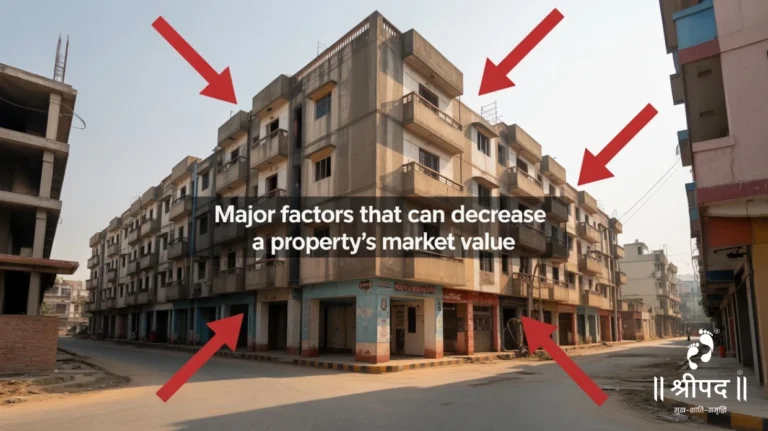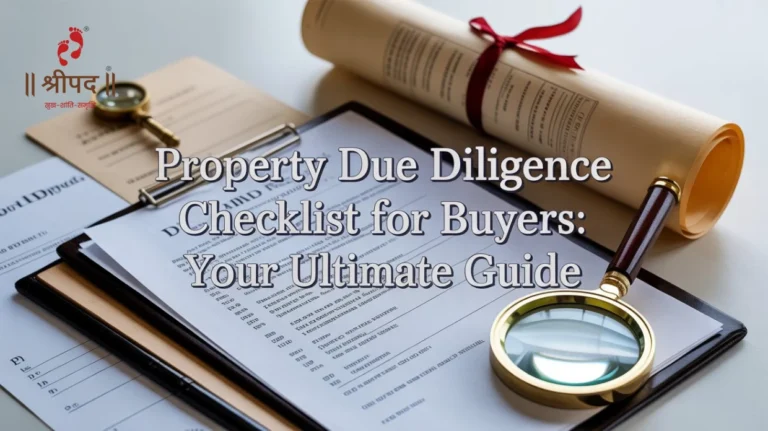- SHREEPAD GROUP
-
+91 83476 68000

Purchasing a property from a builder is often one of the most significant milestones in life. Whether it’s your first home, a luxury upgrade, or a long-term investment, the decision involves not only money but also deep emotions. Builders usually highlight the features of the project with attractive brochures, amenities, and easy payment plans. However, beneath the surface lies the critical layer of legal compliance that every buyer must carefully examine.
Failing to pay attention to the legal aspects of property buying can expose you to risks such as fraudulent transactions, project delays, or disputes over ownership. In this guide, we’ll break down the most important legal checks, documents, and precautions every buyer should take when purchasing property from a builder.
Why Legal Checks Are Essential in Real Estate
Real estate in India is booming, but it is also a sector where irregularities are common. Builders sometimes fail to secure mandatory approvals, overpromise on delivery timelines, or sell units in projects that are under litigation. Without proper legal scrutiny, buyers may face challenges such as:
- Loss of investment in unauthorized or disputed projects.
- Prolonged litigation over ownership or possession.
- Unexpected delays due to regulatory hurdles.
- Purchasing properties with unclear titles or encumbrances.
In short, legal due diligence ensures that your property purchase is secure, transparent, and future-proof. Moreover, a property purchased with verified legal compliance often performs better in the market. Understanding factors that influence a property’s resale value, such as clear titles, approved building plans, and occupancy certificates, can help buyers make smarter long-term decisions.
Crucial Legal Aspects When Buying from Builders
Clear Land Title
The foundation of any project lies in the ownership of land. The builder must either own the land or possess authorized development rights. Buyers should confirm that:
- The title deed is in the builder’s name.
- The property is free from disputes and encumbrances.
- The ownership history is verified through a title search at the registrar’s office.
This step guarantees that the builder is legally entitled to construct and sell units on the land. For more details on verifying ownership and title issues, refer to everything you need to know about property titles and ownership.
Approved Building Plans
Construction must adhere to plans sanctioned by local municipal or development authorities. Before investing, confirm that:
- The layout is officially approved.
- The floor area ratio (FAR) is within permissible limits.
- The project complies with local zoning and land-use policies.
Failure to verify approvals may result in demolition notices or cancellation of your property registration in the future.
RERA Compliance
The Real Estate (Regulation and Development) Act (RERA) has become a game-changer in protecting buyers. Under this law, all major residential and commercial projects must be registered with the state RERA authority. As a buyer, you should:
- Check the project’s RERA number and status.
- Review the builder’s track record, completion timelines, and approvals on the RERA website.
- Ensure clauses in your agreement align with RERA rules.
Projects registered under RERA offer higher levels of accountability and transparency.
Agreements and Documentation
Two key documents require careful attention:
Allotment Letter: Issued at the time of booking, it specifies unit details, payment structure, and related terms.
Agreement for Sale: A registered document signed by both buyer and builder. It must clearly outline:
- Price details and payment deadlines.
- Carpet area versus super built-up area.
- Possession date and compensation in case of delay.
Registering the sale agreement under the Registration Act makes it legally binding and enforceable.
Completion and Occupancy Certificates
Before you take possession of your property, insist on:
Completion Certificate (CC): Confirms the building has been constructed in line with the approved plan.
Occupancy Certificate (OC): Certifies that the building meets safety and regulatory norms and is suitable for occupation.
Without these certificates, your property may face legal and operational challenges, including denial of water or electricity connections.
Encumbrance Verification
An Encumbrance Certificate (EC) ensures the property is free from loans, mortgages, or pending litigation. It can be obtained from the sub-registrar’s office and should ideally cover the last 15–30 years of ownership history.
Pending Dues and Taxes
Builders are responsible for clearing:
- Property taxes.
- Utility charges.
- Development fees owed to local authorities.
Unpaid dues may be transferred to the buyer, creating unnecessary financial burdens.
Home Loan Sanction for the Project
Projects that have pre-approval from reputed banks and financial institutions often carry lower risk. While this signals credibility, buyers must still conduct their own legal checks rather than relying solely on the bank’s due diligence.
Buyer Rights and Remedies
In case of disputes or delays, buyers have multiple legal avenues:
- Filing complaints under RERA.
- Approaching consumer courts for service deficiency.
- Seeking compensation or enforcement through civil courts.
Proper agreements and verified documents strengthen your position if conflicts arise.
Frequent Legal Traps Buyers Should Avoid
- Trusting Verbal Assurances: Always demand written, signed agreements.
- Ignoring the Carpet Area: Builders may highlight super built-up area to inflate size.
- Skipping Background Check of Builder: Investigate past projects, delays, or litigation.
- Not Registering Agreements: Unregistered documents lack legal enforceability.
- Unclear Cost Breakups: Hidden costs such as GST, parking, and club membership fees should be clarified upfront.
How Legal Advisors Add Value
Hiring a professional legal consultant may seem like an additional expense but can save you significant trouble in the long run. A real estate lawyer ensures:
- Verification of ownership and approvals.
- Drafting or reviewing agreements.
- Identification of hidden or unfavorable clauses.
- Guidance in case of disputes or litigation.
Having expert assistance offers peace of mind, ensuring your investment is fully protected. Many buyers underestimate the importance of legal advice in property buying until they encounter disputes, but seeking guidance early helps avoid costly mistakes.
Why Builders Value Legally Informed Buyers
Surprisingly, builders themselves benefit when buyers demand transparency. Legally aware customers ensure smoother transactions, fewer disputes, and stronger reputations. Ethical developers welcome scrutiny since their projects meet all regulatory requirements.
This is exactly why trusted names in Surat, such as Shreepad Group, are highly regarded. By maintaining complete legal compliance, timely delivery, and transparency, Shreepad Group has earned the confidence of thousands of homeowners.
Benefits of Choosing Reputed Builders
When you opt for established builders, you can expect:
- Projects with all statutory approvals.
- Transparent sales processes and documentation.
- Timely possession and adherence to commitments.
- Hassle-free financing and loan approvals.
Shreepad Group, one of Surat’s most respected developers, stands out for its strong legal compliance, ethical practices, and consistent track record of delivering top-quality projects.
Conclusion
Buying property from a builder involves more than selecting the right location and floor plan. It requires an in-depth understanding of the legal framework that governs ownership, approvals, and possession. From verifying land titles to ensuring RERA compliance and obtaining occupancy certificates, every detail matters.
Overlooking these aspects could leave you vulnerable to disputes and financial loss, but following the right legal process ensures that your dream home becomes a reality without obstacles.
If you are looking for a safe, transparent, and rewarding buying experience in Surat, always choose a developer who values legal compliance as much as quality construction.
Ready to secure your dream home in Surat without worrying about legal hassles? Partner with Shreepad Group, where every project reflects trust, transparency, and timely delivery. Take the safe route and buy property from best builder in Surat with Shreepad Group for a seamless and secure investment.
See Related News & Insights Blog

09.10.2025
How to Select the Right Property Type to Suit Your Needs
Purchasing a property is one of the most important financial decisions you can make. Whether it’s your first home, an...

09.10.2025
Essential Tips for Investing in a Growing Real Estate Market
Investing in real estate can be one of the smartest financial decisions when approached with knowledge and strategy. A thriving...

09.10.2025
Major Factors That Can Decrease a Property’s Market Value
In the real estate world, property value is more than just a number — it reflects the strength of your...

09.10.2025
Property Due Diligence Checklist for Buyers: Your Ultimate Guide
Purchasing a property is one of the biggest investments in life. Whether it’s a residential apartment, a commercial space, or...
